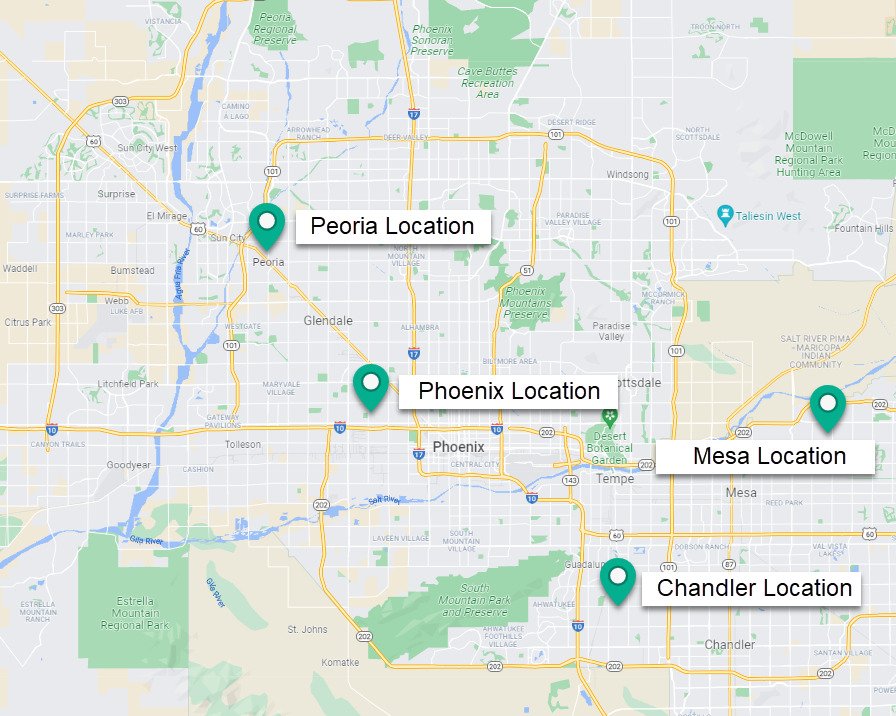The term “landing pages” gets thrown around a lot in marketing. And for a while, when I was a newbie marketer, it felt like it could mean a million things. Sadly (or perhaps with good reason), the term still can mean a variety of things.
What Are Landing Pages?
Here’s what the term “landing pages” means:
- Any page that a user lands on to enter a website
So, any page can be a landing page if that’s where the user entered the website! Yes, it’s that simple! And also kind of complicated? Users can enter a website from numerous channels, including but not limited to:
- A paid search ad
- A paid social ad
- An organic social post
- Organic search results
As marketers, it’s our job to deliver a landing page that enhances the user experience, partly based on that target channel. If a user is taking the time to visit our website after wandering the vast wastelands of the Internet, we might as well show them a nice time.
What Are Local Landing Pages?
In the case of local SEO, a local landing page is used to enhance local visibility. It’s an opportunity for an organization to say, “Hello, users and Google! I am here, in Mesa, AZ. Please notice me in this hyper-localized context!”
If an organization has multiple locations, it needs a local landing page for each location to effectively communicate its service regions to users and search engines.
Local landing pages can be formatted in many shapes, sizes, and strategies. In my time as a local marketer, I’ve seen some pretty horrendous location pages, and I’ve also seen what it takes to make a local landing page compete in a crowded marketplace.
Here are five things you might not have known about local landing pages:
1. They Aren’t Doorway Pages
Doorway pages made SEO news way back in 2006 when BMW mentioned “used car” 40 times on a page on its German website. This sneaky “used car” page then redirected to a page with new cars. As you can guess, Google was not happy about this bad behavior and blacklisted the company from car-related search results for up to a year. Ouch.
BMW was using doorway pages, and they paid the price.
For decades the phrase “doorway pages” has been uttered with a certain sense of taboo and foreboding. It’s not the kind of phrase that is used in marketing as a compliment.
Essentially, doorway pages are spammy, keyword-stuffed pages intended to trick a search engine into ranking a site. They typically don’t have any content that qualifies them to rank, and they’re not built with the user experience in mind.
In contrast, local landing pages are developed with the user in mind. If I’m a user trying to find a local tire shop, do I really want the home page of a national brand? Or do I want a page with a center’s local address, phone number, and service information?
The difference between local landing pages and doorway pages is apparent.

In the image above, we have two local dentists. The dentist on the left has concocted a chaotic doorway page SEO scheme, wherein someone who types “toothaches” in Boise will somehow end up on an arbitrary page with a zip code. Conversely, the dentist on the right has built a localized website where they have a page for each service provided to the Boise community.
Local landing pages are a crucial part of any local SEO experience because they are designed to serve the local user, while doorway pages are intended to trap the local user in a confusing keyword-first purgatory.
2. CTA Placement Matters
Just about every local landing page serves the same type of user: someone local with an urgent need.
Think about it:
- Users who need a local HVAC company probably broke something
- Users looking for an Italian restaurant need to book their grandma’s birthday dinner
- Users in a car accident need a tow truck ASAP
So, if you build a local landing page telling users, “Hey! I’m nearby and I’m offering the thing you need!” why would you bury the opportunity for them to contact you?
Surprisingly, I’ve seen many location pages “bury the lead” and position the CTA at the end of the page like it’s some pot of gold at the end of a content rainbow. However, it turns out that local users are not leprechauns.

Users want that “gold”—the form or phone number—as soon as possible. So place it at the top of the page!
3. You Don’t Need a Lot of Content
I reiterate: local users don’t have a lot of time. As we forge ahead in this mobile-only SEO landscape, it doesn’t make much sense to woo users with a 2,000-word essay about your Tempe, AZ AC repair services.
Cut to the chase. When I’m working with clients on local landing pages, I recommend 250-500 words.
A cursory check for “AC Repair Tempe” reveals the following word counts for location pages ranking #1-3 in the Local Pack:
- #1 Ranking: 233 words
- #2 Ranking: 182 words
- #3 Ranking: 195 words

“AC Repair Tempe” Landing Page Word Counts By Ranking In the Local Pack
As we can see with this totally-not-scientific check in a local market, the top-ranking local landing pages from the example above barely achieve more than 200 words. Ideally, there would be a study out there to formally correlate Word Counts on landing pages with rankings. But for now, it’s a common-sense recommendation from yours truly, sourced from my experience in building hundreds of successful local landing pages.
4. One Local Landing Page Might Not Be Enough
When I’m tasked with developing a local SEO strategy for a business with multiple locations, there’s almost always one resounding problem:
There aren’t enough local landing pages.
Companies looking to expand into new markets are often unprepared for the intricate Rubix cube that is the Local Search Microcosm.
Local Business Scenario
You’re a leading HVAC company based in Memphis, TN, and you’ve just acquired a new location in Nashville. However, opening a new store in Nashville, TN unfortunately isn’t as simple as a grand opening party with cookies and lemonade for the entire staff. There are:
- Competitors with entire websites dedicated to Nashville
- Competitors with marketing departments dedicated to ranking in Nashville
- Customers who already know about those competitors in Nashville
Nashville, TN, is a marketplace. It’s a specific community with a unique network of user intents and competitors with their own local SEO strategies. So, how do you remain competitive?
The answer is location-specific service pages.

Here we see why our new Nashville location needs multiple local landing pages for each service. If we have a competitor that has a Nashville AC Repair page, a Nashville Furnace Repair page, a Nashville Duct Cleaning page, and a Nashville Heating page, how can our single Memphis local landing page compete?
When we start to think about each location as its own microsite, we start to compete with competitors that have dedicated an entire website to that community.
5. Location Pages Can Get More Traffic Than National Service Pages
How important is local SEO to your overall marketing strategy? Well, if you’re reading this article, it’s probably more important and crucial than you think.
It comes down to this:
If employees connect with local customers in the day-to-day, then you need local landing pages. Because Google has definitely localized those SERPs.
I’ve seen organizations direct their entire strategy around a fancy national website that solidified their brand. While a pretty website is good, local content is ultimately the money-maker.
If I look at a SERP like “roof repair,” and I’m in Atlanta, GA, here’s what I see in the SERP:
SERP For “Roof Repair” In Atlanta

I didn’t include anything about my location when I typed “roof repair” into Google, but this search still triggers a Local Pack. But what happens below the Local Pack?

Below the Local Pack, we see only local pages in search results. If you are a national franchise trying to grow your local SEO presence, local landing pages should be the backbone of your overall strategy. Local landing pages contribute directly to ranking in the local pack, and they’re what will appear in search results below that.
So, don’t neglect your local landing pages! They’re probably your best opportunity to generate growth.
Takeaways
Here are a few takeaways for building and maintaining your website’s local landing pages:
| DO | DON’T |
|---|---|
| Organize local landing pages into your website structure | Create local landing pages around random keywords |
| Make local landing pages conversion-focused | Bury a CTA at the bottom of your local landing page |
| Keep content simple and short | |
| Create multiple service pages for specific markets | |
| Think local-first if that’s your target audience |
Use these tips to develop a successful local landing page strategy. Or, if the intersection of content strategy, market demand, and GBP optimization seems like a lot (and yes, it is), reach out to our team about local SEO management services!
The post 5 Things You Didn’t Know About Local Landing Pages appeared first on Portent.




